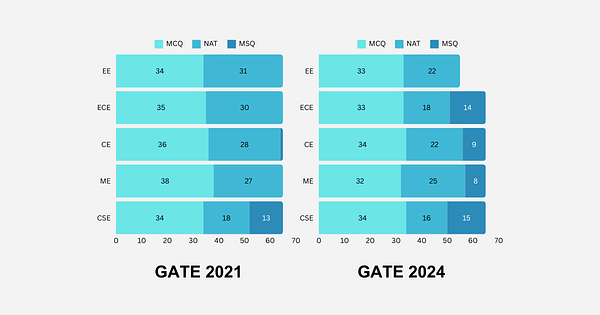
GATE 2025 vs Previous Years Trends:
The GATE exam is the gateway for engineering students to secure admission into NITs, IITs, IIITs, and postgraduate programs or jobs in Public Sector Undertakings. The GATE exam was first introduced in 1983 and at that time it was conducted only for two streams, science and engineering but now the exam is conducted across 30 disciplines. The eligibility criteria are the same as before, but the exam pattern has significantly changed. Over the years, the competition for GATE has evolved significantly.
GATE 2025 exam
brings new dynamics to the competition, shaped by changing trends, and exam policies. In this article, we will compare the GATE 2025 vs previous years to understand how the GATE 2025 competition level has changed and what factors contribute to these shifts.
Also read:
GATE 2025 Virtual Calculator: Steps to Download and Use
Quick Links:
GATE 2025 vs Previous Years Trends
GATE 2025 vs previous years trends comparison will help you understand how the GATE 2025 competition level has evolved. If you are planning to appear in the GATE 2025 exam, you must be aware of the gate previous year questions and question papers to know the pattern of the exam has changed. In this section we have provided a detailed GATE 2025 vs previous year trends comparison to help you gain a good understanding of the upcoming exam.Increasing Number of Applicants
The number of GATE applicants has been steadily rising. This year, the registration process for GATE 2025 was conducted from February 28 to Oct 11, 2024, and the number of registered students has crossed 10 lakh which is a significant rise from the past years. This increase shows the growing interest among students, driven by the demand for better career opportunities, both in the academic field and industry. Some reasons for the increasing number of students are GATE scores are now used by more PSUs, making it an important exam for job seekers. Also, international universities in countries like Singapore and Germany accept GATE scores for admissions.
Wider Scope of GATE Subjects
GATE has expanded its subject list over the years, with 30 subjects offered in 2025, compared to 23 in 2015. New additions, such as Environmental Science, Humanities, and Psychology, have attracted students from diverse academic backgrounds. The introduction of interdisciplinary subjects has diversified the applicant pool. Students from non-engineering backgrounds are now participating in GATE, adding more variety to the competition.
Tougher Exam Patterns
The difficulty level of GATE has been steadily increasing which can be analyzed by studying the GATE previous year questions. For GATE 2025 the paper is expected to include higher-order questions, requiring more clarity and advanced problem-solving skills. The number of Multiple Select Questions (MSQs) since 2021 has increased. The percentage of MCQs has decreased over the years as the exam has shifted towards MSQs. Introduced in 2021, MSQs have steadily gained prominence, accounting for a significant portion of the exam in 2025. NATs or Numerical Answer Type Questions have maintained a stable proportion, although their relative weight slightly decreased in 2025 due to the rise in MSQs. Here is a graph showing the changes in the GATE exam types of questions from 2021 and 2024. It highlights the following trends:

Increased Competition for PSUs
GATE scores have become a standard for PSU recruitment, making it a highly competitive exam for students seeking jobs. Many PSUs now have stricter cutoffs compared to earlier years. Students often aim for a rank below 1,000 to secure interviews with top PSUs like IOCL, ONGC, and NTPC. In 2020, PSUs offered jobs to around 20,000 students, but the number of applicants was far greater. The demand-to-supply ratio has increased the pressure on students.
Growth in Online Learning Resources
The availability of online courses, test series, GATE previous year questions, and study materials has grown immensely in the last decade. Platforms like Unacademy, BYJU'S, and others have made GATE preparation more accessible, leveling the playing field. Students from rural areas can now access the same resources as those in metropolitan cities. However, this has also raised the overall GATE 2025 competition level, as more students are better prepared.
GATE 2025 Vs Previous Years Trends: Success Rates
While the number of applicants has increased, the success rate (students qualifying GATE) remains between 15-18%. In 2020, 8.58 lakh students registered, and 1.26 lakh qualified. In 2025, even with an increase in students, the success rate is expected to remain the same, meaning more intense competition. This stability in the success rate indicates that only the best-prepared students qualify, raising the bar each year.
The Role of Technology in GATE Exam Administration
The GATE exam authority has also introduced new technology to ensure fairness and efficiency. Recently, the authority has been conducting a fully online exam with improved proctoring methods, and also AI tools are being used to detect cheating. These measures reduce malpractices, ensuring that only genuine students compete.
Day by day, the GATE exam is undoubtedly getting more competitive than its previous exam types. The rising number of students, tougher exam patterns, and diverse opportunities have reshaped the competition of GATE 2025 vs. Previous Years. To succeed, students must adopt an intellectual preparation plan, focusing on time management, and consistent practice. By understanding these changes students can confidently tackle GATE 2025 and achieve their goals.
GATE Related Articles
We hope that the above article on competitive analysis of GATE 2025 vs Previous Years Trends shall help you with information about the changes in the recent GATE exam. For the latest updates on GATE, stay tuned to CollegeDekho!
Are you feeling lost and unsure about what career path to take after completing 12th standard?
Say goodbye to confusion and hello to a bright future!

FAQs
MSQs are questions with multiple correct options, no partial marks are given. NATs are questions requiring numerical answers and no options are provided.
The number of applicants has increased steadily. For example, in 2020, around 8.5 lakh people registered, but in 2025, over 10 lakh students applied.
GATE now offers subjects like Humanities, Environmental Science, and Psychology, attracting students from diverse fields.
Yes, the questions now focus more on concepts and numerical problems making the exam tougher than before.
No, PSUs mainly recruit from core subjects like Mechanical, Electrical, Civil, and Computer Science Engineering.
Coaching is helpful but not mandatory. With so many online resources, many students clear GATE without formal coaching.
The new challenges of GATE exam are tougher exam patterns, increased competition from diverse academic fields and higher cutoffs for PSU jobs.
Subjects like Data Science, AI, and Humanities have been added in recent years to meet industry demands and allow interdisciplinary studies.
GATE Previous Year Question Paper
Was this article helpful?



















Similar Articles
JEE Advanced Marks vs Rank OBC
Is NCERT Enough for BITSAT?
BITSAT Slot Booking 2025 (Phase 1 May 13) - Dates, Process, How to Book Slot
Polytechnic Courses 2025: Details, Fees, Eligibility, Admission Criteria
JEE Advanced 2025 Exam Day Instructions - Documents to Carry, Guidelines
How to Score 200+ Marks in JEE Advanced?